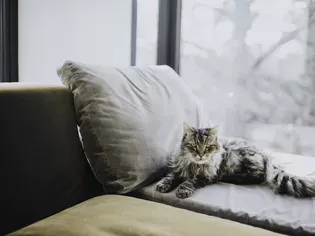Do Cats Have Menopause?
Updated on 05/27/24

Do Cats Have Menopause? The Curious Case of Feline Menopause
Many pet owners wonder if their beloved feline companions experience menopause, just like humans do. The answer to this intriguing question is not as straightforward as one might think.
Understanding Menopause in Humans
Menopause is a natural biological process that occurs in women when their ovaries stop producing eggs. This typically happens between the ages of 45 and 55. Symptoms of menopause can include hot flashes, mood swings, sleep disturbances, and changes in menstrual cycles.
The Biology of Cats
Unlike humans, cats do not have a regular menstrual cycle. Instead, they experience estrus, or "heat," which occurs about every two to three weeks. During estrus, a female cat will produce eggs and become receptive to mating.
Do Cats Experience Menopause?
Technically, cats do not experience menopause in the same way that humans do. They do not have ovaries that stop producing eggs. However, as cats age, they may experience a gradual decline in their reproductive function.
Signs of Declining Reproductive Function
* Reduced frequency of estrus: Older cats may experience fewer heat cycles per year.
* Shorter estrus periods: The duration of each heat cycle may become shorter.
* Decreased fertility: Older cats may have a lower chance of becoming pregnant.
Other Factors Influencing Reproductive Function
In addition to age, several other factors can influence reproductive function in cats, including:
* Health: Certain medical conditions, such as thyroid problems or kidney disease, can affect reproductive function.
* Nutrition: A poor diet can impact overall health and reproductive function.
* Stress: Stress can suppress estrus cycles and reduce fertility.
Implications for Cat Owners
Understanding the changes in reproductive function that occur in older cats can help owners make informed decisions about their pets' health and well-being.
* Spaying: Spaying is a surgical procedure that removes the ovaries and uterus. This eliminates the risk of unwanted pregnancies and certain reproductive health issues. Spaying is typically recommended for cats that are not intended for breeding.
* Health monitoring: As cats age, it is important to monitor them for any signs of declining reproductive function. Regular veterinary checkups can help detect and address any underlying health issues that may be affecting reproductive health.
Conclusion
While cats do not experience menopause in the same way that humans do, they may experience a gradual decline in reproductive function as they age. Understanding the changes that occur and the factors that influence reproductive health in older cats is essential for responsible pet ownership.
Explore More Pets

Cat Behavior Problems
How to Stop Aggression in Kittens

Long-Haired Cat Breeds
Siberian Cat: Breed Profile, Characteristics, & Care

Cat Behavior Problems
How to Stop Kittens From Scratching and Biting

Long-Haired Cat Breeds
Turkish Angora: Cat Breed Profile, Characteristics & Care

Basic Training
How to Socialize Your Kitten

Short-Haired Cat Breeds
Cute Pictures & Facts About Calico Cats & Kittens

Litter Box Training
Training Your Kitten to Use the Litter Box

Long-Haired Cat Breeds
10 Fun Facts About White Cats
